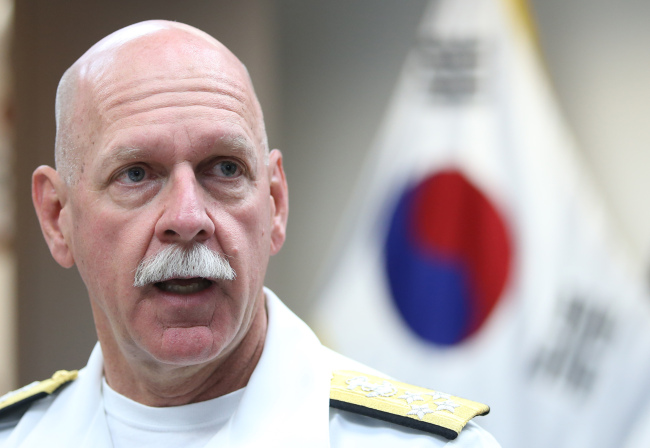North Korea’s perceived ambition to develop a submarine-launched ballistic missile is “destabilizing” the region, a top U.S. Navy official said Monday, warning its lack of transparency would stoke uncertainties and opaque intent may make other countries’ objectives “dangerous.”
Amid unabated tension in the South China Sea, Adm. Scott Swift, commander of the U.S. Pacific Fleet, also reiterated Washington’s opposition to Beijing’s unilateral, coercive approach, while downplaying his surveillance flight over the disputed waters as a “routine” mission.
In May, Pyongyang apparently succeeded in ejecting a dummy projectile from a newly built 2,000-ton submarine at a shipyard on the country’s eastern shore, a key early stage in SLBM development. Yet controversy persists over the program’s progress and even the authenticity of the test per se, though the South Korean military assesses that the communist country will likely be able to deploy a submarine equipped with a ballistic missile as early as in two years.
“Even if it’s photoshopped, there’s a desire to pursue that capability and that’s very destabilizing,” Swift said during an interview with The Korea Herald and other news outlets at the U.S. Naval Forces Korea command in Seoul, referring to the images released by state media.
“So we can’t afford to say there’s nothing there. We have to assume that there’s something there. … We have to have a strategy for the worst case.”
 |
Adm. Scott Swift, commander of the U.S. Pacific Fleet, speaks during an interview with The Korea Herald and other news outlets at the U.S. Naval Forces Korea command in central Seoul. Yonhap |
The admiral was in Seoul as part of his first overseas trip since becoming chief of one of the world’s largest fleets in May, which included a stop in Manila and will bring him to Tokyo on Wednesday. Later in the day, he met with Joint Chiefs of Staff chairman Adm. Choi Yoon-hee, Chief of Naval Operations Adm. Jung Ho-sup and other ranking officials here.
North Korea’s opacity is a “first element” causing instability within the region, he said, stressing the significance of transparency in diplomatic relations through recent nuclear negotiations between world powers and Iran.
Yet the commander expressed confidence at his fleet’s capability and readiness against any contingency, saying it was “fully prepared” to support the U.S. Forces Korea led by Gen. Curtis Scaparrotti.
“It’s very difficult to determine not only capacity but also capability because North Korea is so opaque. But more important than that is their intent, because intent makes another country’s objectives so dangerous as far as the inability to assess their intent is concerned,” Swift said.
“I think that’s the question we have to ask ourselves, ‘Why can’t that be applied with respect to North Korea?’ So the overtures have been made; the opportunities are standing.”
In Manila, the admiral joined a “routine” surveillance flight on Saturday over the South China Sea where Beijing has been building artificial islands to the dismay of the Philippines.
The seven-hour mission was designed to “see firsthand some of the new operational capabilities” of the P-8A Poseidon, he said, declining to give specific details.
While displaying resistance to what he called the “approach of coercion, force to get one’s desire to meet their ends,” he appeared upbeat about bilateral military ties with China, saying they have been “normalized.”
“The military-to-military relationship with China that we enjoy is a positive development. And I think the communications at sea are positive and structured,” Swift added.
By Shin Hyon-hee (
heeshin@heraldcorp.com)








